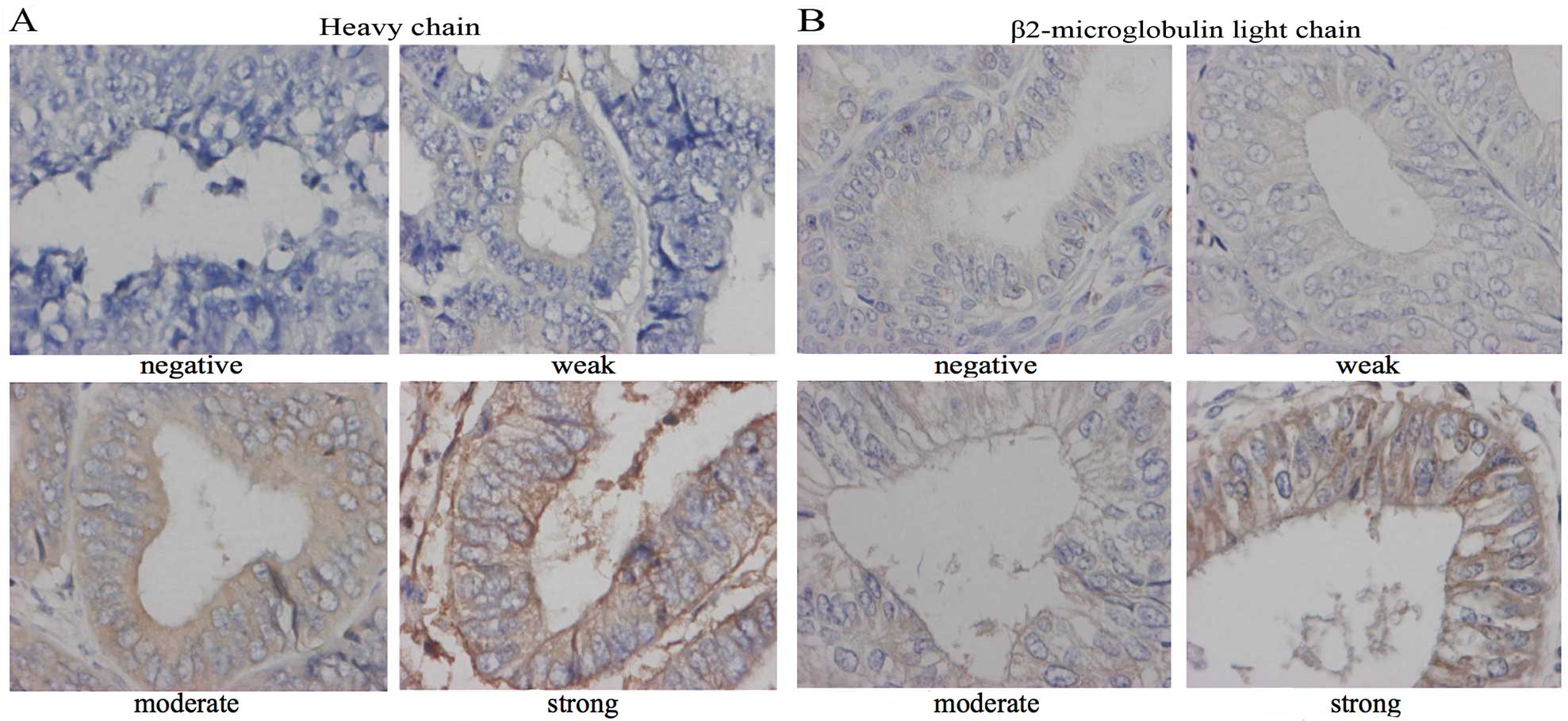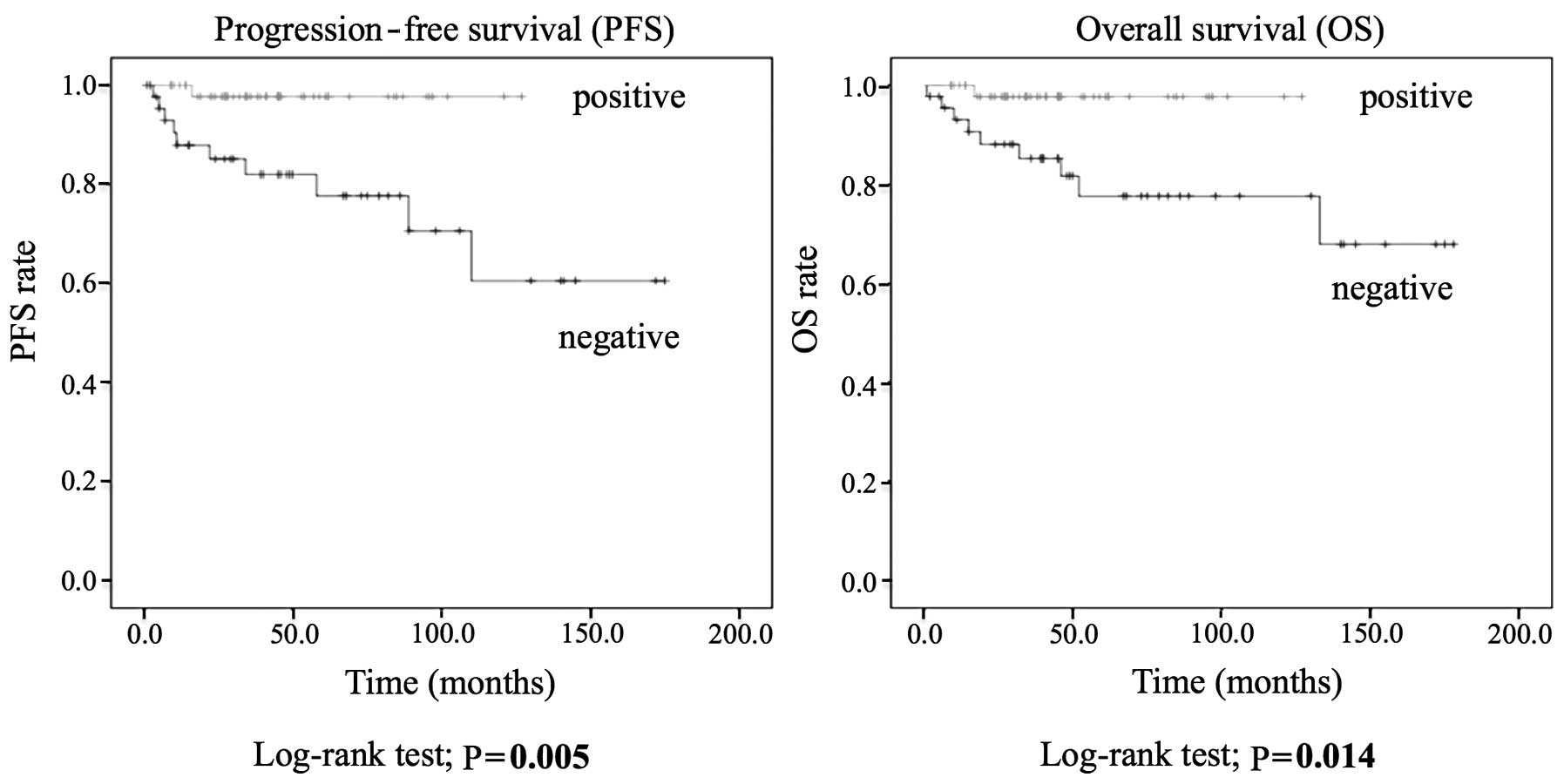|
1
|
Garrido F, Ruiz-Cabello F, Cabrera T,
Pérez-Villar JJ, López-Botet M, Duggan-Keen M and Stern PL:
Implications for immunosurveillance of altered HLA class I
phenotypes in human tumours. Immunol Today. 18:89–95. 1997.
View Article : Google Scholar : PubMed/NCBI
|
|
2
|
Hicklin DJ, Marincola FM and Ferrone S:
HLA class I antigen downregulation in human cancers: T-cell
immunotherapy revives an old story. Mol Med Today. 5:178–186. 1999.
View Article : Google Scholar : PubMed/NCBI
|
|
3
|
Gabrilovich D and Pisarev V: Tumor escape
from immune response: Mechanisms and targets of activity. Curr Drug
Targets. 4:525–536. 2003. View Article : Google Scholar : PubMed/NCBI
|
|
4
|
Rolland P, Deen S, Scott I, Durrant L and
Spendlove I: Human leukocyte antigen class I antigen expression is
an independent prognostic factor in ovarian cancer. Clin Cancer
Res. 13:3591–3596. 2007. View Article : Google Scholar : PubMed/NCBI
|
|
5
|
Mehta AM, Jordanova ES, Kenter GG, Ferrone
S and Fleuren GJ: Association of antigen processing machinery and
HLA class I defects with clinicopathological outcome in cervical
carcinoma. Cancer Immunol Immunother. 57:197–206. 2008. View Article : Google Scholar : PubMed/NCBI
|
|
6
|
Speetjens FM, de Bruin EC, Morreau H, et
al: Clinical impact of HLA class I expression in rectal cancer.
Cancer Immunol Immunother. 57:601–609. 2008. View Article : Google Scholar : PubMed/NCBI
|
|
7
|
Ueda Y, Ishikawa K, Shiraishi N, Yokoyama
S and Kitano S: Clinical significance of HLA class I heavy chain
expression in patients with gastric cancer. J Surg Oncol.
97:451–455. 2008. View Article : Google Scholar : PubMed/NCBI
|
|
8
|
Mizukami Y, Kono K, Maruyama T, Watanabe
M, Kawaguchi Y, Kamimura K and Fujii H: Downregulation of HLA class
I molecules in the tumour is associated with a poor prognosis in
patients with oesophageal squamous cell carcinoma. Br J Cancer.
99:1462–1467. 2008. View Article : Google Scholar : PubMed/NCBI
|
|
9
|
Kikuchi E, Yamazaki K, Torigoe T, Cho Y,
Miyamoto M, Oizumi S, Hommura F, Dosaka-Akita H and Nishimura M:
HLA class I antigen expression is associated with a favorable
prognosis in early stage non-small cell lung cancer. Cancer Sci.
98:1424–1430. 2007. View Article : Google Scholar : PubMed/NCBI
|
|
10
|
Bijen CB, Bantema-Joppe EJ, de Jong RA,
Leffers N, Mourits MJ, Eggink HF, van der Zee AG, Hollema H, de
Bock GH and Nijman HW: The prognostic role of classical and
nonclassical MHC class I expression in endometrial cancer. Int J
Cancer. 126:1417–1427. 2010.PubMed/NCBI
|
|
11
|
Kaneko K, Ishigami S, Kijima Y, et al:
Clinical implication of HLA class I expression in breast cancer.
BMC Cancer. 11:4542011. View Article : Google Scholar : PubMed/NCBI
|
|
12
|
Barrier BF, Kendall BS, Sharpe-Timms KL
and Kost ER: Characterization of human leukocyte antigen-G (HLA-G)
expression in endometrial adenocarcinoma. Gynecol Oncol. 103:25–30.
2006. View Article : Google Scholar : PubMed/NCBI
|
|
13
|
de Jong RA, Boerma A, Boezen HM, Mourits
MJ, Hollema H and Nijman HW: Loss of HLA class I and mismatch
repair protein expression in sporadic endometrioid endometrial
carcinomas. Int J Cancer. 131:1828–1836. 2012. View Article : Google Scholar : PubMed/NCBI
|
|
14
|
Murakami A, Fukushima C, Yoshidomi K,
Sueoka K, Nawata S, Yokoyama Y, Tsuchida S, Ismail E, Al-Mulla F
and Sugino N: Suppression of carbonyl reductase expression enhances
malignant behaviour in uterine cervical squamous cell carcinoma:
Carbonyl reductase predicts prognosis and lymph node metastasis.
Cancer Lett. 311:77–84. 2011. View Article : Google Scholar : PubMed/NCBI
|
|
15
|
Torigoe T, Asanuma H, Nakazawa E, Tamura
Y, Hirohashi Y, Yamamoto E, Kanaseki T, Hasegawa T and Sato N:
Establishment of a monoclonal anti-pan HLA class I antibody
suitable for immunostaining of formalin-fixed tissue: Unusually
high frequency of down-regulation in breast cancer tissues. Pathol
Int. 62:303–308. 2012. View Article : Google Scholar : PubMed/NCBI
|
|
16
|
Murakami A, Yakabe K, Yoshidomi K, Sueoka
K, Nawata S, Yokoyama Y, Tsuchida S, Al-Mulla F and Sugino N:
Decreased carbonyl reductase 1 expression promotes malignant
behaviours by induction of epithelial mesenchymal transition and
its clinical significance. Cancer Lett. 323:69–76. 2012. View Article : Google Scholar : PubMed/NCBI
|
|
17
|
Seliger B: Molecular mechanisms of MHC
class I abnormalities and APM components in human tumors. Cancer
Immunol Immunother. 57:1719–1726. 2008. View Article : Google Scholar : PubMed/NCBI
|
|
18
|
Kondratiev S, Sabo E, Yakirevich E, Lavie
O and Resnick MB: Intratumoral CD8+ Tlymphocytes as a prognostic
factor of survival in endometrial carcinoma. Clin Cancer Res.
10:4450–4456. 2004. View Article : Google Scholar : PubMed/NCBI
|
|
19
|
Ino K, Yamamoto E, Shibata K, Kajiyama H,
Yoshida N, Terauchi M, Nawa A, Nagasaka T, Takikawa O and Kikkawa
F: Inverse correlation between tumoral indoleamine 2,3-dioxygenase
expression and tumor-infiltrating lymphocytes in endometrial
cancer: Its association with disease progression and survival. Clin
Cancer Res. 14:2310–2317. 2008. View Article : Google Scholar : PubMed/NCBI
|
















